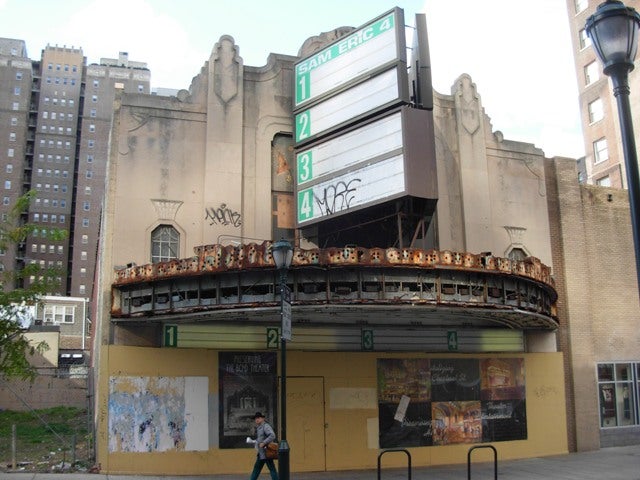Boyd again designated historic

Aug. 8
By Thomas J. Walsh
For PlanPhilly
The Preservation Alliance’s dogged nomination efforts were rewarded Friday when the Center City’s Boyd Theatre was officially re-designated a historic site this morning by the Philadelphia Historical Commission.
That status gives the commission the authority to approve, or deep-six, any plans to alter the exterior of the former movie palace on the 1900 block of Chestnut Street.
However, the designation might amount to nothing if the lavish interior of the Art Deco gem is not protected as well, argues Gersil Kay, a specialist in pre-1940 buildings who is the founder and chair of Building Conservation International, a local nonprofit, and a member of the International Coalition of Art Deco Societies. Kay was present at this morning’s meeting and was one of several people to address the need to further protect the landmark cinema.
“Philadelphia is the only city that doesn’t protect historic interiors open to the public,” said Kay, a vocal proponent of recent legislation introduced by City Councilman Bill Green that would do just that. The bill would authorize the Historical Commission to designate – and regulate – “interior portions of buildings that are, or were designed to be, open or accessible to the public by invitation or otherwise.”
The City Planning Commission and Council will resume discussing Green’s bill in mid-September.
Kay is passionate about the Boyd, which is currently for sale by Live Nation, its owners. “The theater without the interior is just a façade, and that doesn’t mean anything,” Kay said. “This is the next step. And even if they do pass everything, it won’t be implemented until the beginning of 2009, and any developer can get ahold of this property in the meantime and strip it, like they did the Rittenhouse Club, of all the important artifacts, and then say, ‘Oh look – there’s nothing there.’
“This is what the urgency of this thing is,” she said. “We have 300 years of architecture, and the more we tear down, the less people will come here, and that means a financial loss in addition to a cultural loss. Philadelphia depends on historic tourism. It’s the most lucrative industry we have now. People come here to see the real, authentic buildings. They don’t come here to see a pastiche of somebody’s idea of what used to be. We have the real thing.”
The theater has been on the commission’s register of historic places in the past, but a former owner sued to have its designation revoked, which the Pennsylvania State Supreme Court did in 1991.
“I’m thrilled about the historic designation progress, and proud to have played a very small part in moving that process along,” said Sharon Pinkenson, executive director of the Greater Philadelphia Film Office, in an email to PlanPhilly.
Renovating and re-opening the Boyd for its original purpose would be the best-case scenario, many preservationists and film historians agree, but the challenge for a new owner would be figuring the means to make it economically viable to do so. The Boyd, built in 1928, is on the National Trust for Historic Preservation’s list of America’s 11 Most Endangered Historic Places.
“My hope is that the new owners will understand the value of a loving restoration,” Pinkenson said, “And [understand] the importance that re-use plans include the ability to use the entire building for an event film venue, for film premieres and festivals, at the least.”
Pinkenson said that Philadelphia is the only major American city without a movie palace that seats at least 800 people. “We look forward to the magnificent Boyd Theatre to fill that need in the near future,” she said.
“All you need is a little imagination,” Gersil said.
Contact the reporter at thomaswalsh1@gmail.com
WHYY is your source for fact-based, in-depth journalism and information. As a nonprofit organization, we rely on financial support from readers like you. Please give today.



